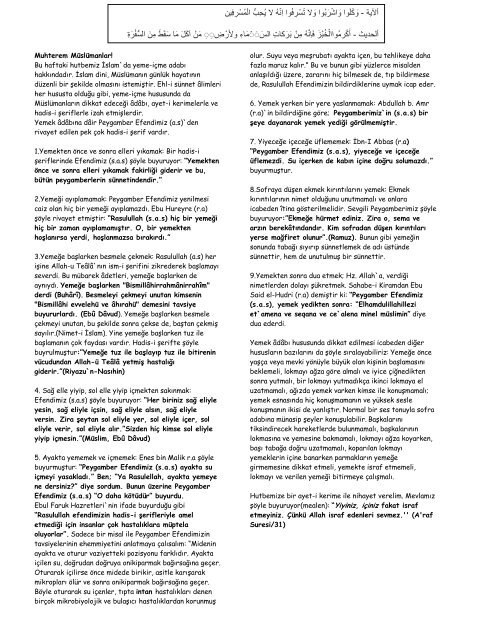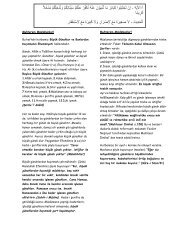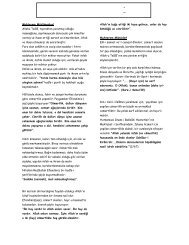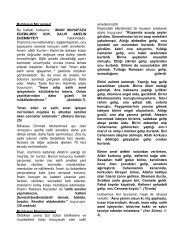07-01-2011 – Yeme-İçme Âdâbı - suleymaniye.org
07-01-2011 – Yeme-İçme Âdâbı - suleymaniye.org
07-01-2011 – Yeme-İçme Âdâbı - suleymaniye.org
You also want an ePaper? Increase the reach of your titles
YUMPU automatically turns print PDFs into web optimized ePapers that Google loves.
Muhterem Müslümanlar!<br />
Bu haftaki hutbemiz İslam`da yeme-içme adabı<br />
hakkındadır. İslam dini, Müslümanın günlük hayatının<br />
düzenli bir şekilde olmasını istemiştir. Ehl-i sünnet âlimleri<br />
her hususta olduğu gibi, yeme-içme hususunda da<br />
Müslümanların dikkat edeceği âdâbı, ayet-i kerimelerle ve<br />
hadis-i şeriflerle izah etmişlerdir.<br />
<strong>Yeme</strong>k âdâbına dâir Peygamber Efendimiz (a.s)`den<br />
rivayet edilen pek çok hadis-i şerif vardır.<br />
1.<strong>Yeme</strong>kten önce ve sonra elleri yıkamak: Bir hadis-i<br />
şeriflerinde Efendimiz (s.a.s) şöyle buyuruyor: “<strong>Yeme</strong>kten<br />
önce ve sonra elleri yıkamak fakirliği giderir ve bu,<br />
bütün peygamberlerin sünnetindendir.”<br />
2.<strong>Yeme</strong>ği ayıplamamak: Peygamber Efendimiz yenilmesi<br />
caiz olan hiç bir yemeği ayıplamazdı. Ebu Hureyre (r.a)<br />
şöyle rivayet etmiştir: “Rasulullah (s.a.s) hiç bir yemeği<br />
hiç bir zaman ayıplamamıştır. O, bir yemekten<br />
hoşlanırsa yerdi, hoşlanmazsa bırakırdı.”<br />
3.<strong>Yeme</strong>ğe başlarken besmele çekmek: Rasulullah (a.s) her<br />
işine Allah-u Teâlâ`nın ism-i şerifini zikrederek başlamayı<br />
severdi. Bu mübarek âdetleri, yemeğe başlarken de<br />
aynıydı. <strong>Yeme</strong>ğe başlarken "Bismillâhirrahmânirrahîm"<br />
derdi (Buhârî). Besmeleyi çekmeyi unutan kimsenin<br />
"Bismillâhi evvelehü ve âhırahü" demesini tavsiye<br />
buyururlardı. (Ebû Dâvud). <strong>Yeme</strong>ğe başlarken besmele<br />
çekmeyi unutan, bu şekilde sonra çekse de, baştan çekmiş<br />
sayılır.(Nimet-i İslam). Yine yemeğe başlarken tuz ile<br />
başlamanın çok faydası vardır. Hadis-i şerifte şöyle<br />
buyrulmuştur:”<strong>Yeme</strong>ğe tuz ile başlayıp tuz ile bitirenin<br />
vücudundan Allah-ü Teâlâ yetmiş hastalığı<br />
giderir.”(Riyazu`n-Nasıhin)<br />
4. Sağ elle yiyip, sol elle yiyip içmekten sakınmak:<br />
Efendimiz (s.a.s) şöyle buyuruyor: “Her biriniz sağ eliyle<br />
yesin, sağ eliyle içsin, sağ eliyle alsın, sağ eliyle<br />
versin. Zira şeytan sol eliyle yer, sol eliyle içer, sol<br />
eliyle verir, sol eliyle alır.”Sizden hiç kimse sol eliyle<br />
yiyip içmesin.”(Müslim, Ebû Dâvud)<br />
5. Ayakta yememek ve içmemek: Enes bin Malik r.a şöyle<br />
buyurmuştur: “Peygamber Efendimiz (s.a.s) ayakta su<br />
içmeyi yasakladı.” Ben; “Ya Rasulellah, ayakta yemeye<br />
ne dersiniz?” diye sordum. Bunun üzerine Peygamber<br />
Efendimiz (s.a.s) “O daha kötüdür” buyurdu.<br />
Ebul Faruk Hazretleri`nin ifade buyurduğu gibi<br />
“Rasulullah efendimizin hadis-i şerifleriyle amel<br />
etmediği için insanlar çok hastalıklara müptela<br />
oluyorlar”. Sadece bir misal ile Peygamber Efendimizin<br />
tavsiyelerinin ehemmiyetini anlatmaya çalısalım: “Midenin<br />
ayakta ve oturur vaziyetteki pozisyonu farklıdır. Ayakta<br />
içilen su, doğrudan doğruya onikiparmak bağırsağına geçer.<br />
Oturarak içilirse önce midede birikir, asitle karışarak<br />
mikropları ölür ve sonra onikiparmak bağırsağına geçer.<br />
Böyle oturarak su içenler, tıpta intan hastalıkları denen<br />
birçok mikrobiyolojik ve bulaşıcı hastalıklardan korunmuş<br />
نيِف ِ رْسُمْلا ُّبِحُي لا ُهَّنِا<br />
اوُفرْسُت ِ لاو َ اوُبَرْشا َو اوُلُكوَ - ةيلآأ<br />
َرْفُّسلا َنِم َطَقَس اَم َلَكَا ْنَم َِ َِ ِض ْرلأو ِءاَم َّ ََ َسلا ِتاكَرَب ْنِم ُهَّنِاَف َزْبُخْلااوُم ِرْكَأ<br />
- ثيدحلأ<br />
هَل َرِفُغ<br />
olur. Suyu veya meşrubatı ayakta içen, bu tehlikeye daha<br />
fazla maruz kalır.” Bu ve bunun gibi yüzlerce misalden<br />
anlaşıldığı üzere, zararını hiç bilmesek de, tıp bildirmese<br />
de, Rasulullah Efendimizin bildirdiklerine uymak icap eder.<br />
6. <strong>Yeme</strong>k yerken bir yere yaslanmamak: Abdullah b. Amr<br />
(r.a)`in bildirdiğine göre; Peygamberimiz`in (s.a.s) bir<br />
şeye dayanarak yemek yediği görülmemiştir.<br />
7. Yiyeceğe içeceğe üflememek: İbn-I Abbas (r.a)<br />
“Peygamber Efendimiz (s.a.s), yiyeceğe ve içeceğe<br />
üflemezdi. Su içerken de kabın içine doğru solumazdı.”<br />
buyurmuştur.<br />
8.Sofraya düşen ekmek kırıntılarını yemek: Ekmek<br />
kırıntılarının nimet olduğunu unutmamalı ve onlara<br />
icabeden îtina gösterilmelidir. Sevgili Peygamberimiz şöyle<br />
buyuruyor:”Ekmeğe hürmet ediniz. Zira o, sema ve<br />
arzın berekâtındandır. Kim sofradan düşen kırıntıları<br />
yerse mağfiret olunur”.(Ramuz). Bunun gibi yemeğin<br />
sonunda tabağı sıyırıp sünnetlemek de adı üstünde<br />
sünnettir, hem de unutulmuş bir sünnettir.<br />
9.<strong>Yeme</strong>kten sonra dua etmek; Hz. Allah`a, verdiği<br />
nimetlerden dolayı şükretmek. Sahabe-i Kiramdan Ebu<br />
Said el-Hudri (r.a) demiştir ki: “Peygamber Efendimiz<br />
(s.a.s), yemek yedikten sonra: “Elhamdulillahillezi<br />
et`amena ve seqana ve ce`alena minel müslimin” diye<br />
dua ederdi.<br />
<strong>Yeme</strong>k âdâbı hususunda dikkat edilmesi icabeden diğer<br />
hususların bazılarını da şöyle sıralayabiliriz: <strong>Yeme</strong>ğe önce<br />
yaşça veya mevki yönüyle büyük olan kişinin başlamasını<br />
beklemeli, lokmayı ağza göre almalı ve iyice çiğnedikten<br />
sonra yutmalı, bir lokmayı yutmadıkça ikinci lokmaya el<br />
uzatmamalı, ağızda yemek varken kimse ile konuşmamalı;<br />
yemek esnasında hiç konuşmamanın ve yüksek sesle<br />
konuşmanın ikisi de yanlıştır. Normal bir ses tonuyla sofra<br />
adabına münasip şeyler konuşulabilir. Başkalarını<br />
tiksindirecek hareketlerde bulunmamalı, başkalarının<br />
lokmasına ve yemesine bakmamalı, lokmayı ağza koyarken,<br />
başı tabağa doğru uzatmamalı, koparılan lokmayı<br />
yemeklerin içine banarken parmakların yemeğe<br />
girmemesine dikkat etmeli, yemekte israf etmemeli,<br />
lokmayı ve verilen yemeği bitirmeye çalışmalı.<br />
Hutbemize bir ayet-i kerime ile nihayet verelim. Mevlamız<br />
şöyle buyuruyor(mealen): “Yiyiniz, içiniz fakat israf<br />
etmeyiniz. Çünkü Allah israf edenleri sevmez.'' (A'raf<br />
Suresi/31)
Dear Muslims<br />
This week’s hutbah will be about the manners of eating<br />
and drinking according to Islam.<br />
Our religion Islam requests Muslim’s daily lives to be very<br />
tidy. Like in every subject, Ahl-i Sunnah Alims have<br />
explained us with Ayahs and Hadith-i Serifs, the manners<br />
we should consider while eating and drinking.<br />
There are many Hadith-i Sherifs involving manners of<br />
eating and drinking. Let’s mention some of these:<br />
1. To wash the hands before and after eating. In a hadith,<br />
Prophet Muhammed (sas) says “Washing the hands<br />
before and after eating will prevent poverty; this is<br />
also the Sunnah of all Prophets.”<br />
2. Not to dispraise the food. Prophets Muhammed (sas)<br />
never dispraised any edible food. Abu Hurayrah (ra)<br />
narrated that the Prophet (sas) never dispraised any<br />
food. If he liked it, he would’ve eaten from it, if he didn’t<br />
like it; he would’ve just left it.<br />
3. To recite the Basmalah before eating. Rasulullah (sas)<br />
loved to mention Allah’s (cc) name before doing<br />
everything. He used to say "Bismillâhirrahmânirrahîm"<br />
before He began to eat. (Buhârî) The Prophet used to<br />
advise those who f<strong>org</strong>ot to recite the Basmalah to say<br />
"Bismillâhi evvelehü ve âhırahü".(Ebû Dâvud). If one who<br />
f<strong>org</strong>ot to recite the Basmalah says "Bismillâhi evvelehü ve<br />
âhırahü" after he remembers, it will be considered as<br />
recited at start.<br />
Again to begin eating with a taste of salt also has a lot of<br />
benefits. In a hadith it is said “Allah (cc) will remove<br />
seventy illnesses from one‟s body that begins and ends<br />
eating by tasting salt”. (Riyazu`n-Nasıhin)<br />
4. To keep away from eating and drinking with the left<br />
hand. Rasulullah (sas) say’s “every one of you should eat<br />
with your right hand, drink with your right hand, take<br />
with your right hand and give with your right hand.<br />
This is because Shaytaan eats with the left, drinks<br />
with the left, gives with the left and takes with the<br />
left. None of you shall eat nor drink with your left<br />
hands.” (Muslim,Ebu Davud)<br />
5. Eating and drinking while standing: Enes bin Malik (r.a)<br />
says “Rasulullah (sas) has forbidden drinking water<br />
while standing” I asked “Ya Rasulellah, what about<br />
„eating‟ while standing? Thereupon the Prophet (sas) said<br />
“that is even worse”.<br />
Ebul Faruk (ks) said “because many people disobey the<br />
prophet‟s (sas) advice, they come across many illnesses<br />
throughout their life.”<br />
Let’s try to express the importance of the Prophet’s (sas)<br />
Hadith-i Sherifs by just one example: The position of the<br />
stomach while sitting down and standing up changes.<br />
Water that’s drunk while standing up directly passes to<br />
the duodenum. But when its drunk while sitting down, it<br />
first gathers in the stomach and then mixing with the<br />
acid kills the bacteria then it passes to the duodenum.<br />
Those who drink water while sitting down will be<br />
protected from many microbiological and infectious<br />
diseases. One who drinks water or any other drinks while<br />
standing are more likely to catch these illnesses. Many<br />
examples like this show us the importance of following<br />
the advices of Rasulullah (sas), regardless of any<br />
explanations about their benefits and any scientific<br />
reasons.<br />
6. Not to lean anywhere while eating: As Abdullah b. Amr<br />
(r.a) informed us; Rasulullah (sas) was never seen eating<br />
while leaning on something.<br />
7. To blow on things we eat and drink: Ibn-i Abbas (r.a)<br />
said “Rasulullah (sas) never blew on any food or drinks.<br />
He also never breathed into the cup he was drinking<br />
from.”<br />
8. To eat crumbs of food that has fallen to the table. We<br />
shouldn’t f<strong>org</strong>et that bread crumbs are also nimahs and<br />
should show great respect to it. Prophet Muhammed (sas)<br />
says “show respect to bread, because bread is the<br />
blessing of the earth and the skies. Whoever eats<br />
bread crumbs that have fallen to the table will be<br />
f<strong>org</strong>iven” (Ramuz).Likewise after finished eating,<br />
clearing the plate with a piece of bread so that there<br />
isn’t any food left on it is also a Sunnah, in fact it’s a<br />
f<strong>org</strong>otten Sunnah.<br />
9. To make dua after food, to thank Allah (cc) for all the<br />
nimahs He has given to us. Ebu Said el-Hudri (r.a) from<br />
the Sahabi said that the Prophet (sas) used to say<br />
“Elhamdulillahillezi et`amena ve seqana ve ce`alena<br />
minel muslimin” after eating.<br />
Let’s mention some other manners involving eating and<br />
drinking according to Islam: To wait for the elders or<br />
ones who have higher ranks to begin eating. To take a<br />
mouth bite, not more than that, to chew on the food fully<br />
before swallowing and to not reach for the second bite<br />
before swallowing. Not to speak while food is in the<br />
mouth, also not speaking at all or speaking loudly while<br />
eating are both wrong. Speaking with a normal and<br />
appropriate tone. Not to do such things that disgust<br />
people. Not to stare at people while their eating also not<br />
to stare at their food. Not to reach the mouth over the<br />
plate while taking a bite. To be careful that fingers don’t<br />
touch the food while dipping pieces of bread into it. To be<br />
careful about israf and to try to finish the food that is<br />
offered.<br />
Let’s finish our hutbah with a meaning of an ayah “eat<br />
and drink: but don‟t waste. Certainly Allah does not<br />
love the wasters.” (Surat-ul A‟raf/31)





